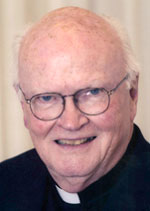In a recent column, I suggested that Pope Francis would do the whole world a favor by writing an encyclical on water as a sacramental reality and a justice issue in contemporary life. I would now like to suggest that something similar could be done on the theme of oil — its sacramental applications and its critical role in the world economy.
It is interesting to note that oil and water occupy a prominent place in geopolitical affairs, as well as in the sacramental life of the church. Why not, then, address these urgent issues associated with oil and water in papal encyclicals? These are social justice issues, and the encyclicals, since “Rerum Novarum” in 1891, have been instruments of motivation and instruction on themes of social justice.
Our global dependence on oil is well-known. Our reluctance to develop energy alternatives that would lower our dependence on oil is news to no one.
[hotblock]
Examining the environmental and economic implications of human decision-making with regard to our uses of oil pulls personal preferences and public policies into the justice arena where open and unbiased debate is needed if human security and progress are to be preserved.
Catholics, reflecting on the role of oil in their sacramental life, should have faith-based motivation for thinking theologically, ethically and practically about the uses of oil for fuel and transportation, the conservation of oil as a nonrenewable natural resource, and the management of accidents such as off-shore oil-spills and on-land derailment of tank cars, or leaks in oil pipelines.
Encyclicals typically are addressed to Catholics worldwide and to all other persons of good will. Within that audience, there are impressive numbers of scientists and engineers, consumers and policymakers, philosophers and theologians and countless others who, if encouraged now to think about oil, could contribute immensely to the advancement of international security and world peace.
Anyone who has administered or received the sacrament of the sick, or anointing of the sick, as it is formally called, with its application of blessed oil to the forehead and hands, indicative of the anointing of the whole body, can appreciate the relatedness of this to the application of oil to the body of an athlete in ancient Olympic times.
Oil strengthened the muscles. In the sacrament of anointing, the church prays for healing, but if that is not God’s will in a given instance, the prayer is for spiritual strength for the person who is seriously ill and needs assistance in bearing the burden of illness. Once called “extreme unction” and misnamed the “last rites,” the sacrament of the sick became synonymous with imminent death and instead of easing anxiety it often activated fear. This sacrament also takes away sin.
There is an urgent pastoral need today to clarify and communicate the positive meaning of the sacrament of anointing. A papal encyclical on the subject would be timely. Though less urgent, but useful, it would be an explanation of the role of oil in the administration of the sacraments of baptism, confirmation and holy orders.
And it would be more than timely to elevate the geopolitical discussion of the supply and distribution of petroleum in a social justice framework. An encyclical by Pope Francis could do just that.
***
Jesuit Father Byron is university professor of business and society at St. Joseph’s University, Philadelphia. Email: wbyron@sju.edu.



Share this story